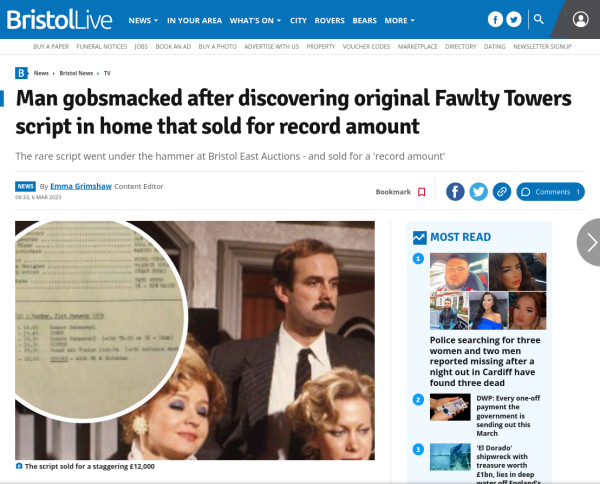Public notice, public ignorance
As seen in Gloucester Lane, BS2.

In the words of lots of disappointed parents trying to teach their offspring manners, “What’s the magic word?” 😉
As seen in Gloucester Lane, BS2.

In the words of lots of disappointed parents trying to teach their offspring manners, “What’s the magic word?” 😉
The language used in official responses to news stories seems to have been rigid and formulaic in recent times, particularly amongst those organisations within or linked to the public sector.
Today’s edition of The Register reports that ACRO, the UK’s Criminal Records Office was taken offline due to a security breach. The site currently displays a holding page blaming ‘technical issues‘, a fine example of misleading bureaucratic language.
This is the site’s holding page as this post is published.

El Reg notes that manages ACRO people’s criminal record information, running checks as needed on individuals for any convictions, cautions, or current prosecutions. It with British police and businesses, as well as exchanging this data with other countries, particularly where people wish to move or emigrate to another country and a certificate of good behaviour is required from the British police. ACRO has access to data from the Police National Computer via an information sharing agreement with the Cabinet Office.
The data typically handled by ARCO includes name and address history, extended family information, a new foreign address, legal representation, passport information, photo and data PIN cautions, reprimands, arrests, charges or convictions.
Earlier this week, ACRO emailed users to inform them that it had “recently been made aware of a cyber security incident affecting the website between 17th January 2023 and 21 March 2023“, adding that “we have no conclusive evidence that personal data has been affected by the cyber security incident; however it is only right that we inform you of the situation. We are very sorry that because of your interaction with ACRO your data could have been affected, and we are working tirelessly to resolve this matter.”

The message went on to say that “robust measures” had been taken as soon as the breach was discovered. It won’t be the first time that pulling the plug on a website has been described by a public sector organisation spokesperson as “robust”, If your systems were truly “robust”, taking the site offline would not have been necessary.
After intoning the “robust” mantra, ARCO then goes on to say: “We take data security very seriously and will ensure that the matter is fully investigated…. Translating this into plain English, this means “Oh dear! We’ve been caught out!”
The fact that ARCO had not taken data security “very seriously” is clearly highlighted by two facts:
The public sector relies heavily on public trust to do its work. If it really does want to be taken seriously, tough measures need to be taken and implemented, not just for IT security, but in connection a very ancient and fundamental idea: that of honesty.
The Twitter account of the British Government’s Home Office is normally a conduit for the worst ideas dreamt up by the alleged government’s most authoritarian and repressive ministry.
As such it tends to repeat and amplify the dog-whistle racism and xenophobia embodied in the hostile environment that has characterised its attitude to non-British people, particularly if they are not white, since the Home Secretary was one Theresa May, who later went on to do bad prime minister impressions in the Westminster Palace of Varieties.
The post of Home Secretary is currently occupied by one Sue-Ellen Cassiana “Suella” Braverman, a woman of no discernible talent other than being incompetent and nasty.
Braverman is currently on her second term of office as Home Secretary, having been initially appointed as such under the premiership of one Elizabeth Mary Truss on 6 September 2022. However, like her boss, Braverman did not last long in post, resigning because she had made an “honest mistake” (a likely story. Ed.) by sharing an official document from her personal email address with a colleague in Parliament, an action which breached the Ministerial Code.
On 25 October, Braverman was re-appointed as the home secretary by the prime minister Rishi Sunak, in direct contradiction of his promise of “integrity, professionalism and accountability”. Does someone who broke the Ministerial Code have any integrity or professionalism?
Since her re-appointment, has continued with hostile policies towards refugees and asylum seekers with a modern take on the reintroduction on the prison hulks of two centuries ago to house these people before they are deported to that shining beacon of human rights known as Rwanda.
Yesterday, the Home Office’s Twitter account finally admitted how dangerous the Home Secretary was, calling her “one of the greatest injustices in modern Britain” and calling for her end.

The post has since been deleted.
It has often been remarked that Britain and the USA are two countries divided by a common language.
However, let’s not forget that the spread of English around the world resulted in the development of different varieties of English around the world, all with varying degrees of (in)comprehensibility.
A prime example of something beyond the comprehension of your ‘umble scribe turned up this morning in his social media feed. It contains a fine example of some prime official gibberish from the state authorities of New South Wales in Australia.
If you, dear reader, can make any sense of it, please feel free to use the comment form below to provide a translation into British English; furthermore, please feel free to add any punctuation which you deem will aid comprehension as the original notice has none. 😀

The M4 motorway is the main road connection across the Severn estuary between England and South Wales.
Originally it crossed the river at Aust via the Severn Bridge/Pont Hafren, replacing an old ferry service .
After the completion of the Second Severn Crossing, the section of the M4 from Olveston in England to Magor/Magwyr in Wales was re-designated as the M48.
In an act of Whitehall arrogance, the Second Severn Crossing was later renamed the Prince of Wales Bridge with no public consultation, almost as if to prove that Wales is still England’s oldest colony.
Repairs are due to be carried out to potholes on the new bridge and this was duly reported on the Bristol (Evening) Post/Bristol Live website, as is also shown by the following screenshot.
![Headline reads M4 disruption for over 5 hours due to repair potholes [sic]](http://xislblogs.xtreamlab.net/slwoods/wp-content/uploads//sites/23/2023/03/post_severn_bridge.png)
A small problem occurs here. Knowledgeable readers will at once discern that the bridge used to illustrate the link from the site’s home page to the article is actually the 1960s Severn Bridge, not the Charles Philip Arthur George Mountbatten-Windsor Bridge. Has Reach plc also dispensed with picture editors as well as sub-editors in a dual bid to reduce both costs and the quality of its so-called ‘journalism‘,
Finally it is worth noting that this story does not appear on the Post’s Reach stable companion for South Wales, the Western Mail/Wales Online website (affectionately known as Tales Online. Ed.).
And how much did the sale of the original Fawlty Towers script realise?

An apposite quotation from Once in a Lifetime</em> off Talking Heads’ 1980 album Remain in Light captions this image which has now turned up twice this week in my Mastodon social media feed.

Junk food giant McDonalds’ advertising department clearly has as much taste as the food, otherwise it would not have placed the advertisement below by a Cornish bus stop directly opposite Penmount Crematorium on the road between Truro and Carland Cross (the A30/A39 junction).

Will the person who thought this was a good idea be getting a roasting?
Houston, we have a typo…

From my social media feed.
In my first paid job after graduating, your ‘umble scribe received further instruction in English, namely adapting what he wrote to fit in with his then employer’s house style, part of which included the avoidance any ambiguity.
As Merriam Webster points out, ambiguity is defined as “a word or expression that can be understood in two or more possible ways: an ambiguous word or expression“.
If only those writing today’s newspapers had also received such training as your correspondent or access to a newsroom dictionary with the above definition for the entry ambiguity
Experience would suggest neither situation obtains, particularly in the titles of the Reach plc stable of regional “news” titles, as this ambiguous offering from the Daily Post/North Wales Live implies.

Your correspondent diligently read the piece to discover how and what Loggerheads Country Park has been serving weary travellers down the centuries, all to no avail. 🙁